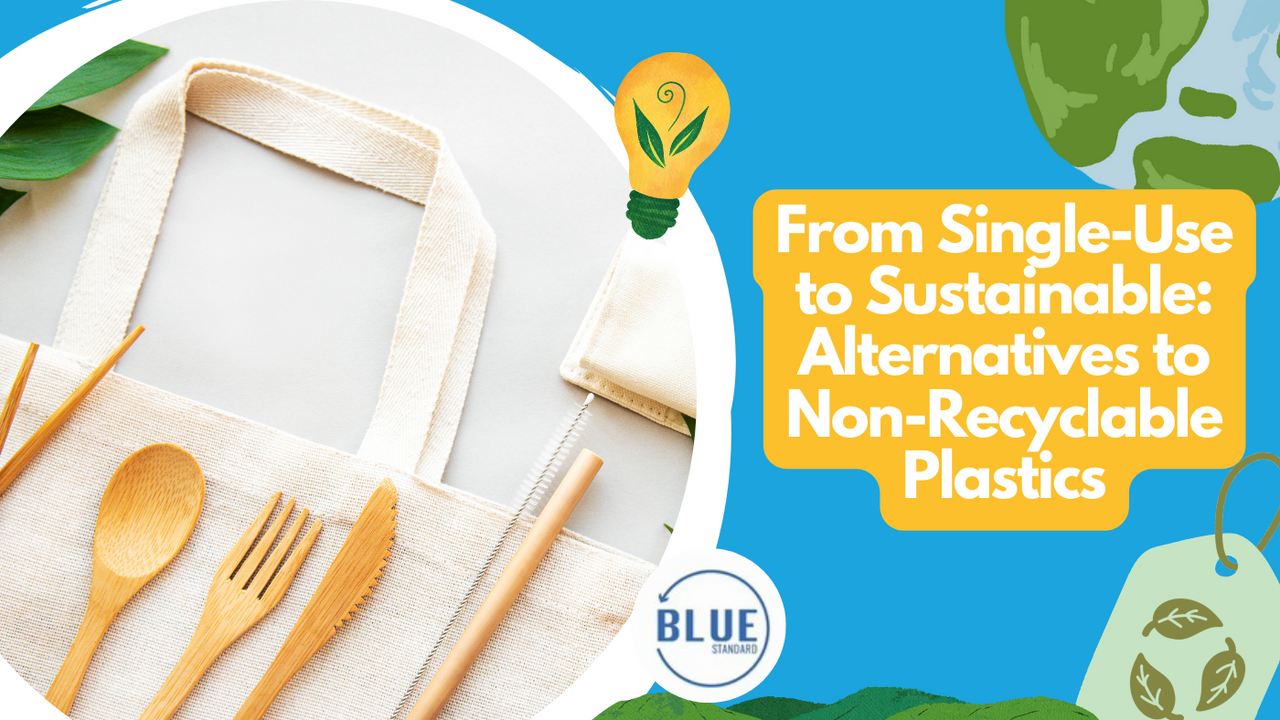
From Single-Use to Sustainable: Alternatives to Non-Recyclable Plastics
It's no secret that plastic pollution is a significant problem facing our planet. Single-use plastics, in particular, contribute to this issue by filling our oceans, harming wildlife, and taking centuries to decompose.
That's why searching for alternatives to non-recyclable plastics that we use daily is essential. Fortunately, many sustainable options are available that you can adapt to your daily routine.
This blog post will explore some eco-friendly alternatives to non-recyclable plastics and the benefits of using these alternatives.
The crisis with non-recyclable plastics

Plastic is everywhere in our modern world, from food and drink packaging to electronic devices we use daily. It's lightweight, cheap to produce, and versatile, making it the go-to material for manufacturers worldwide. However, this widespread reliance on plastic has created a significant environmental problem: non-recyclable plastics.
And not all plastics are created equal. Some plastics can be recycled very quickly, while others cannot. For example, plastic film (like that used to wrap food products) and black plastic trays used for food packaging can't be recycled through traditional recycling programs.
When these non-recyclable plastics end up in the waste stream, there are limited options for dealing with them. They typically end up in landfills, incinerated, or worse, in our oceans and waterways.
The benefits of alternatives to non-recyclable plastics

Alternatives to non-recyclable plastics are critical to reducing the amount of plastic waste that ends up in our environment. These alternatives have a variety of benefits, including being biodegradable, compostable, or recyclable.
This means they can break down naturally or be returned to the earth in a way that doesn't harm the environment. Regarding recycling, alternatives to non-recyclable plastics often have a lower carbon footprint than their traditional counterparts, meaning they're better for the environment overall.
The benefits of alternatives to non-recyclable plastics are manifold. From reducing waste and promoting composability to conserving resources and fostering innovation, these alternatives offer a more sustainable and environmentally-friendly approach to addressing the plastic waste crisis.
In conclusion, the crisis with non-recyclable plastics is a significant environmental and social problem that requires immediate attention and action. By reducing our overall plastic consumption, investing in new recycling technologies, and implementing policy changes, we can address this crisis and move towards a more sustainable future.
7 Eco-friendly alternatives to non-recyclable plastics

As the environmental impact of non-recyclable plastics becomes more evident, there is an increasing need for alternatives to mitigate the adverse effects of plastic waste. Fortunately, several promising alternatives to non-recyclable plastics offer numerous environmental, human health, and sustainability benefits. Let's delve into some of the alternatives to non-recyclable plastics.
#1 Reusable water bottles
Sadly, we dispose of around 50 billion water bottles in the United States alone yearly. And manufacturing and disposing of this massive amount of single-use plastic damages our environment. Instead of using single-use plastic water bottles, consider using a reusable water bottle made from stainless steel, glass, or BPA-free plastic. Not only will this reduce plastic waste in landfills and oceans, but it can also save you a lot of money in the long run.
#2 Reusable shopping bags
Let's face it, we all leave the grocery store with too many plastic bags. They are difficult to store effectively and take hundreds of years to break down in landfill sites. Use reusable shopping bags made from cotton or canvas to reduce the amount of plastic waste you generate. They are durable, washable, and come in different shapes and sizes. You can also store them easily in your car or purse so you will remember them when shopping.
#3 Stainless steel straws
Plastic straws are another huge contributor to plastic waste, with millions of straws ending up in the ocean. For those who can only imagine sipping on a drink with a straw, consider using a stainless steel straw instead of a single-use plastic one. They are durable, reusable, easy to clean, and come in different colors and designs. They will save marine life and the ecosystem.
#4 Compostable food containers
Many restaurants use single-use plastic containers for takeout food. Instead of using these containers, opt for those that are biodegradable and compostable. These containers are made from plant-based materials such as sugar cane or corn, which makes them easily renewable and sustainable. They can also be disposed of by composting, making them a far better alternative to traditional single-use containers.
#5 Beeswax Wraps (instead of cling film)
Cling film is one of the most common forms of plastic packaging we use daily. Consider using beeswax wraps instead of cling film to reduce your plastic usage. These wraps are made from cotton and coated in beeswax, making them a sustainable and eco-friendly solution for wrapping food. They are reusable, washable, and keep your food fresh for longer. Besides, they are easy to wipe down and store in a manageable stack in your kitchen.
#6 Bamboo
Bamboo is a versatile and sustainable alternative to non-recyclable plastics. It's lightweight, sturdy, and can fulfill the same purposes as plastic, minus all the environmental impacts. Additionally, bamboo is biodegradable, making it an excellent alternative for single-use items like utensils, toothbrushes, and straws.
#7 Glass
Glass is another popular alternative to plastic because it's reusable and 100% recyclable. Glass containers are ideal for storing food and beverages, and glass straws are perfect for a sustainable sipping experience.
Making the switch to alternatives!
By adopting and supporting these alternatives, we can move towards a more sustainable future and reduce our reliance on non-recyclable plastics, ultimately benefiting the planet, human health, and future generations.
At Blue Standard, we understand the importance of reducing plastic waste and promoting sustainability.
We are also committed to promoting sustainability and providing our customers with eco-friendly solutions. We encourage everyone to consider switching to alternatives and join us in protecting the planet.
Visit us to learn more about how can you make a difference https://bluestandardinc.com/
Other articles:
Quick links
Search
Privacy Policy
Refund Policy
Terms of Service
Environmental Sustainability Policy
Ethics Policy
Global Human Rights Policy
About us
Creating the new standard in sustainable CPG. Blue Standard is the future of healthier, safer, sustainable products for our families, pets, and planet.
Accepted Payments:

